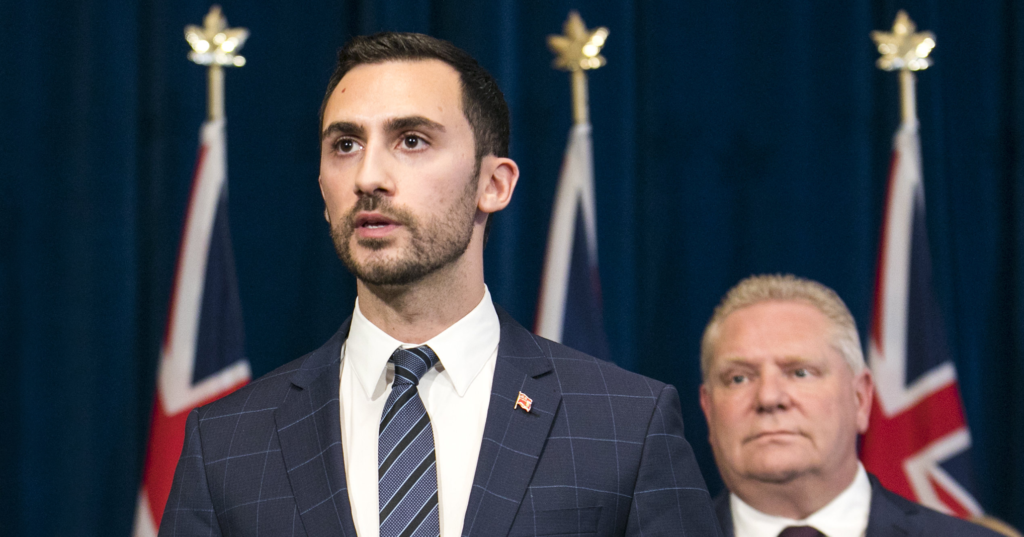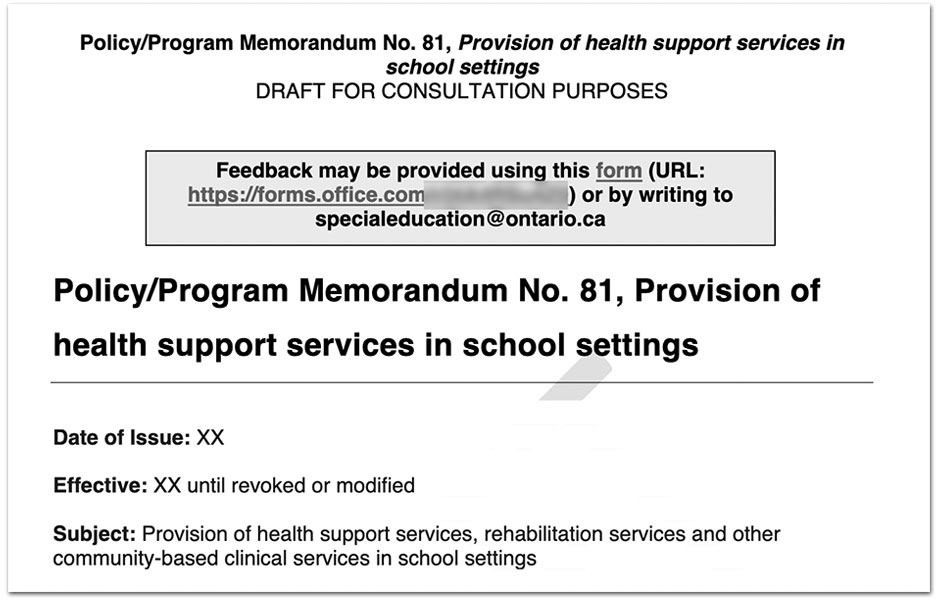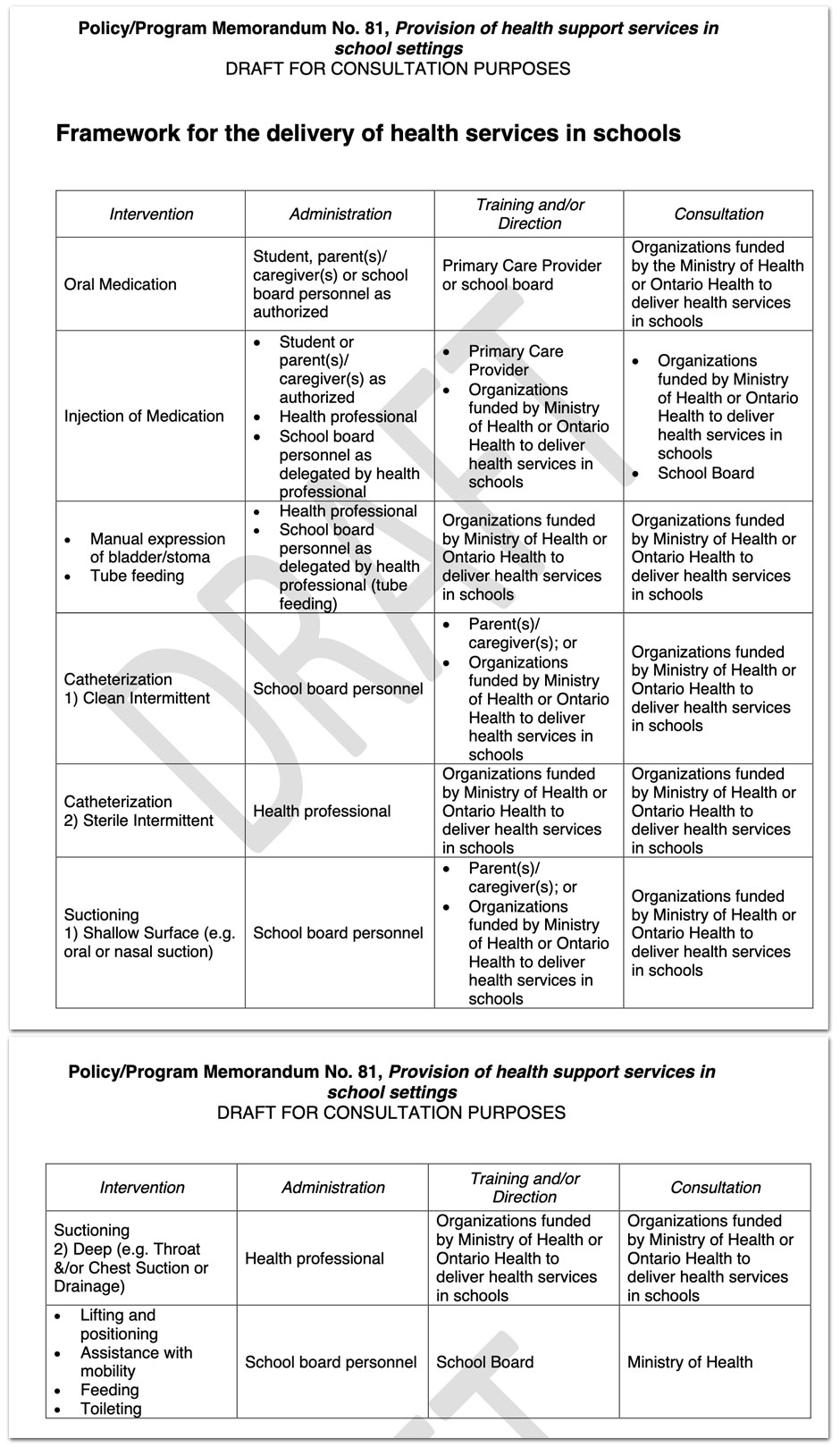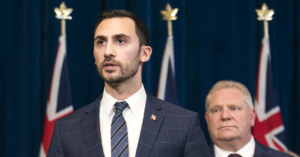
Ontario Planning to Download Health Support Services for Students with Disabilities to Unqualified School Staff, Leaked Draft Suggests
Doug Ford’s Ministry of Education plans to download ‘medical’ and ‘clinical’ service for students with disabilities to school staff, outside agencies
Educational stakeholder groups are warning a draft document circulated by Ontario’s Ministry of Education outlines plans to download “medical” and potentially “clinical” support services for students with disabilities onto unqualified school board staff.
The new update to the government’s longstanding Program Memorandum 81, which covers the provision of health support services, speech and language services and therapy services in Ontario’s schools, would “delegate” many tasks currently handled by qualified health professionals to non-medical school staff.
According to the leaked draft policy document, newly obtained by PressProgress, unnamed “school board personnel” with no professional health or medical backgrounds could soon be tasked with medical responsibilities.

Draft policy document
The draft policy document includes tables listing which health support services could be handled by qualified health professionals and which would be done by unqualified school staff.
The document suggests school staff could handle things like delivering oral medication, conducting “oral and nasal suction” procedures to remove mucus, providing a “clean intermittent” catheterization, as well as lifting, feeding and toileting.
The draft further proposes that tube feeding and injecting medication could be delivered by “school board personnel” as “delegated” by “health professionals.”

Ministry of Education draft policy document
In a written submission to the Ministry of Education, the Elementary Teachers’ Federation of Ontario raised serious concerns with the idea of downloading tasks previously performed by health workers to untrained educators.
“Expanding the scope of health support / medical procedures — including downloading functions that have only ever previously been performed by nurses — to other groups of workers opens a host of concerns,” ETFO said in its submission.
“Expanding the scope of health support/medical procedures and downloading medical services to educational staff who have no health care training is very concerning.”
Likewise, a February 10 letter from the Chair of Halton District School Board’s Special Education Advisory Committee to Education Minister Stephen Lecce, raised serious concerns with the ethics of the draft plan:
“We believe that this is inappropriate, both ethically for medical professionals to be allowed to delegate their tasks to non-medical staff, and morally for the system to require Educational Assistants to undertake services which are not in their job descriptions, they have not been medically trained for and which may impact the life of a student.”
The committee’s chair, Alison Brindle, confirmed “we have serious concerns and reservations about this PPM as currently drafted” and that the Ministry, to date, has not offered any response.
Elsewhere in the draft policy document, the Ministry of Education indicates it would direct local school boards to coordinate “clinical services” for students with disabilities, with the assistance of outside service providers, in classrooms.
The document states:
“Community-based clinical services, including those funded through the Ontario Autism Program (OAP), may be provided in publicly funded schools to support students’ access to learning.”
Ontario Disability Coalition co-founder Sherry Caldwell says not every student has equal access to these clinical services. The current supports are limited to an “inconsistent system” across boards, Caldwell told PressProgress, noting “a few boards employ Occupational Therapists (OT) and Physiotherapists (PT) or Health Assistants and most do not.”
The Ontario Physiotherapy Association told the government, in its written response, only 12 boards or 20% of the total “have in-house physiotherapists, occupational therapists, and/or speech language pathologists.”
Otherwise, Caldwell said, the services can be very expensive: “The cost of raising a child with a physical disability is extremely expensive and sadly these families are always forgotten by policy makers.”
Brindle said, similarly, this PPM sets a “dangerous precedent of families having to rely on insurance or private funds to access essential support, such as nursing support for complex or medically fragile students, or augmenting supports provided by the school board, or a community provider funded by the Ministry such as speech-language pathology or occupational therapy.”
“Those that have access to financial means, insurance policies, or special funding streams will be able to access support more easily and rapidly than others,” Brindle said.
The Special Education Advisory Committee of the Halton District School Board warned that this will mean the provision of key clinical services will likely be inequitable:
“Students with certain exceptionalities will be able to use funding allocated for home services to provide support in the classroom. This will not be the case for students with other exceptionalities who do not receive funding, unless their families are willing to pay for it privately. This is directly in opposition to the aims of HDSB and the Ministry of Education in promoting equitable access to support for all students.”
Neither the committee nor the board responded to requests for comment from PressProgress.
“The same school-based rehabilitation services are not available everywhere on an equitable basis,” Ontario Secondary School Teacher Federation President Karen Littlewood told PressProgress, adding that this is likely to put more strain on existing school staff.
“It’s downloading the responsibility onto boards to figure out what to do and most likely having staff perform procedures who aren’t trained to do so,” Littlewood added.
Compounding that, Littlewood said, many schools are also short-staffed: “EAs have received some training but the arrival of the PPM with those additional clauses and letters of understanding could mean boards go to outside treatment that may not be in the interests of the student, or may not be accessible or provided at an equitable level across the province.”
The PPM also changes the provision of services for autistic students. The draft reads:
“Some students may receive rehabilitation services through the Ontario Autism Program. School boards are encouraged to work with families and providers to facilitate access by these therapists under agreements negotiated between boards, families and providers.”
Laura Kirby-McIntosh, a spokesperson for the Ontario Autism Coalition, said that while some of the support autistic students need could be offered by Educational Assistants, there’s an EA shortage.
“The parents’ dream of their kid getting one solely dedicated EA is just that – it’s a dream, it almost never happens,” Kirby-McIntosh told PressProgress.
Additionally, Kirby-McIntosh noted not all students have equitable access to Ontario Autism Program (OAP) support.
“The OAP is kind of a mess right now,” Kirby-McIntosh said. “So if a parent wants to use their OAP money to support their kid in school, that’s great. But what happens in November when the money runs out?”
Aside from 600 families getting support through the OAP, McIntosh said, there are about 50,000 families on the waitlist, who receive uneven “interim support” – $20,000 if the child is under 6 and $5,000 if the child is over 6.
“As a parent am I obligated to disclose to the school how much funding I have and when it runs out? Will the school board step up and fill in once the funding runs out?”
The document clarifies that “school board personell” will be responsible for delivering “instructional methods” to autistic students — defined as “educators and education workers.” But, the document clarifies, that “therapy” will be the obligation of “OAP service providers.”
But Kirby-McIntosh said the distinction is unclear, as some therapy services will cover education matters. “Some therapy is going to be working on phonics and telling time and curriculum services. We need to get our kids ready for school in a setting like that, before they transition in a highly structured environment.”
Ontario’s Ministry of Education did not respond to requests for comment from PressProgress.
Our journalism is powered by readers like you.
We’re an award-winning non-profit news organization that covers topics like social and economic inequality, big business and labour, and right-wing extremism.
Help us build so we can bring to light stories that don’t get the attention they deserve from Canada’s big corporate media outlets.
Donate



